#compensation
Text
For National Zookeeper Week, it would be interesting to theoretically message or email a local or frequently visited zoo and request as a regular patron that keepers be compensated appropriately for the work they do.
Politely, of course, since those the people monitoring public facing accounts are just the messenger.
Kind of important for people who take care of highly endangered animals to be able to afford rent and food, after all, without having to work multiple jobs.
Might have an interesting impact.
Theoretically.
#national zookeeper week#zoos#living wage#compensation#pay people what they’re worth#sanctuaries count too!#any zoological care or exhibition facility
450 notes
·
View notes
Text










Women in Film Challenge 2023: [64/52] Compensation, dir. Zeinabu irene Davis (USA, 1999)
I hate seeing Deaf in serious relationships with hearing folks who have no experience whatsoever with Deaf people, with our lives, our language, our struggle for full civil rights. Either way, you end up breaking their hearts or they break yours.
147 notes
·
View notes
Text
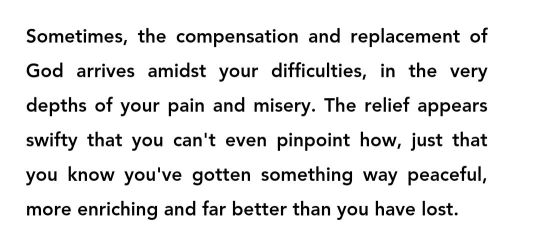
38 notes
·
View notes
Text








UTSUKUSHII KARE SEASON 2 (2023)
#utsukushii kare#utsukare#utsukushii kare: eternal#jdramasource#jdramagifs#jdramaedit#japaneseartistsinc#userdramas#lextag#thoresque#userkareena#tuseralexa#userkimchi#fyeahjdrama#usergooseras#uservid#maregifs#gifs#mare23#COMPENSATION
272 notes
·
View notes
Text
HIHIHIHI‼️‼️ I MIGHT NOT BE ABLE TO POST AS MUCH ORIGINAL CONTENT AS I AM MAKING SOMETHING FOR THE SERIES I PROMISED YOU GUYS 😭😭

have a stanley to compensate ‼️‼️💥💥
#compensation#i am procrastinating#themrfisherotexperience#shitpost#shitposting#stanley tsp#427#tsp stanley#the stanley parable#tsp#tsp ultra deluxe#stanley parable ultra deluxe#the stanley parable ultra deluxe#stanley
23 notes
·
View notes
Text

24 notes
·
View notes
Text


Hit me up to watch me smoke. I promise it’s worth every penny and every minute. You can even pick my outfit out.


#mommysprincess#slutlife#sex and drugs#drugs lovers#sluttoy#pay me for my time#compensation#i sell content#im worth it#big beautiful girl#thick thickwhite girls#thigh boots#thigh tattoo#thickthighssavelives#thicc af#sexy tummy#attenti0nwhor3#i need it#blowing ice#ice ice baby
256 notes
·
View notes
Text
A (Somewhat) Comprehensive List of Fun Job Perks that Won’t Pay Your Rent
Here are some of the super fun job perks the bitchlings told us they’d been offered at a workplace:
free food and beverages
a foosball table
indoor rock climbing wall
on-site laundry services
weekly team happy hours
gym membership or on-site gym
company outings to sports games
company outings to concerts and plays
massage chairs
nap pods
meditation rooms
standing desks and balance ball chairs
the opportunity to volunteer during work hours
automatic vacation day on your birthday
game consoles in the break room
discounts to local stores
unpaid company retreats
a monthly pizza day
performance bonuses paid in alcohol
team building exercises
pet insurance
a commuting allowance
magazine subscriptions
adding work projects to your portfolio
credit to the company store (THIS IS NOT A JOKE)
exposure (NEITHER IS THIS)
a sense of accomplishment (ok this one’s definitely a joke)
Notice anything about the items on this list? As cool as all these job perks might be, not a single one will pay the goddamn rent.
Keep reading.
If you liked this article, join our Patreon!
34 notes
·
View notes
Text
sugarbaby available 💕 single+female dm for details! 💞💞
young female open for any sugar daddies/mommies 😘
10 notes
·
View notes
Note
You mentioned before that most game writers are full-time salaried employees. What conditions allow developers to hire game writers full-time as opposed to film companies?

I believe that, historically, it's probably because of where the two industries came from. Hollywood workers (actors, directors, writers, camera operators, set builders, costumers, etc.) have a long history of having union contracts with studios to work and get paid on a per-project basis likely since that's how business was done via the film industry's ancestor, the theater. They've been doing per-project work for over a hundred years and that's become the norm. Game development evolved from software development, which has existed without a strong union presence or a per-project basis. This pushed the software companies to hire their workers full-time and provide them benefits and perks as a means of attracting and retaining them. Industry overall pay structures are quite different from each other.
This is, of course, my own conjecture. I am no labor historian, so I wouldn't be able to say definitively or point to any primary sources.
[Join us on Discord] and/or [Support us on Patreon]
Got a burning question you want answered?
Short questions: Ask a Game Dev on Twitter
Long questions: Ask a Game Dev on Tumblr
Frequent Questions: The FAQ
26 notes
·
View notes
Text
Happy National Zookeeper Week!
I’ll admit, I’m feeling a little spicy about it this year (well, every year) because zoos use the celebration for lots of positive facility PR, yet staff don’t often get the support and respect that is claimed in those posts.
So I want to share this great article written by a zoo industry consulting group last year looking at the reality of what happens when a workforce ends up conflicted between their passion (zoos and animals) and pragmatism (paying rent, existing in a capitalist society). They assessed AZA compensation rates by region against things such as a living wage and rental rates in the area. (All text formatting within quotes, such as bold and italics, is original to the article text.)
I cannot give the Canopy Group enough support for the way they framed this research:
“By observing the economics of keeper compensation, it’s no secret that keepers land on the lower end of the wage spectrum. Like all other wages and salaries, the market value of keeper compensation is driven by several economic factors – including the size of the labor pool, the rigor and danger of the work, the technical ability required, and the educational requirements. However, there is one factor that artificially lowers the market value of keeper compensation more than any other: passion.
In this article, we’ll take a look at why passion lowers the market value of animal care worker wages. More importantly, we’ll consider many factors that have emerged in recent years that are making people reevaluate the value of following their passion – a trend contributing to The Great Resignation, especially as it applies to zoos, aquariums, and similar organizations. (…)
The argument here is passion versus pragmatism: the unknown versus the sure thing. It is a decision all zookeepers and animal care technicians have made. Working with animals is immensely rewarding, but this passion is also very popular. This, historically, has meant that the keeper candidate pool is very large. Therefore, if the wage is livable and working conditions are reasonable, the pool should remain large. In a very real sense, a passion for animals drives down the market value of keeper compensation. Anyone who has been through an Economics 101 course will recognize this as a fundamental market principle: supply vs. demand.
However, many zoos and aquariums are having a more difficult time filling positions than normal and have started to see higher turnover rates in recent years. This begs the question – is the current keeper wage too low?”
Their findings?
Here’s their graph of “the median wage of keepers from organizations in different AZA-defined regions” from an AZA survey done in 2021. (Median is the type of average that looks at the middle of a data set’s range).
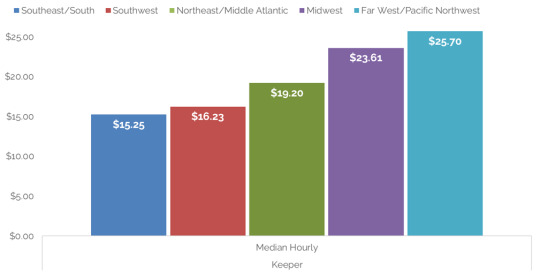
The median wage for AZA keepers in the South/Southeast was just over $15/hr at the low end, and the median wage for AZA keepers in the Far West / PNW was a little under $26/hr. That’s pretty dang low everywhere, especially when you factor in the increased cost of living in places like the West Coast. Also consider that looking at the median wage doesn’t mean this reflects just entry-level compensation - this data indicates the the compensation middle for all keeper positions, including people who have built their careers as keepers in those places long-term.
Then, they compared those wages to the “living wage” in each region - which they defined as “a calculation of what it takes to live in a particular area, without any other income. A living wage calculation takes into consideration how many earners are in a household, how many children are being supported, etc. The living wage includes the costs of all the basic items a household needs to be self-sufficient.”
“If you receive a wage for a job that is below the living wage, then you are essentially taking a negative net income. This is unsustainable for the long term, and essentially defines where wages start to exploit passion.”
Here’s a figure they provided using the MIT Living Wage Calculator showing the average living wage for each of the AZA regions. The chart on the left shows the living wage for a single person with no kids; the second, for two parents with two incomes and one child to support.
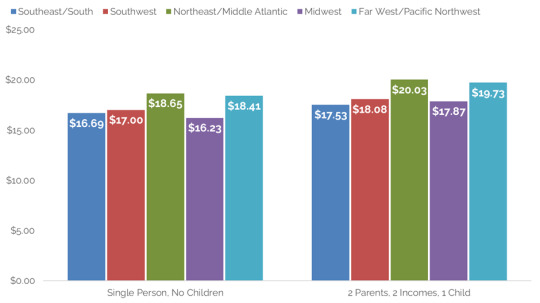
“By comparing the two graphs [to the earlier graph of the AZA median compensation rates], we find that median wages in the Southeast/South and Southwest regions are lower than the living wage for each household configuration in those regions. In other words, if you are a single person household or part of a two-income household raising 1 child in the South, a starting keeper salary will likely leave you with a negative net income. While many people work at this level, it increases the risk of accumulating debt, lowers a person’s ability to afford a home, set a much later retirement age, and can lead to many other negative, long-term effects.”
Big yikes, right?
Next, they looked at living wage vs. compensation for single parents.
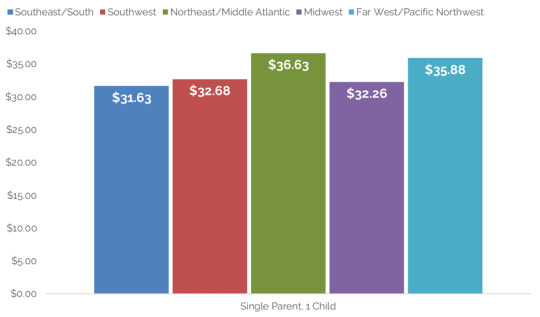
“The single-parent living wage exceeds the average keeper wage in all AZA regions. In fact, the living wage required as a single parent is double the average AZA keeper wage in some regions.”
And then they did housing, specifically, being able to purchase a home.
“In many places, even a two-income household at an average keeper salary would not purchase a mid-level home. This means that keepers have to wait far longer than their peers to purchase a home. While paying rent in the meantime, this rent will account for a larger portion of their income than their peers. All in, these effects can set hopeful homeowners back years or decades.”
Canopy’s conclusion was something anyone involved in the field knew was coming.
“Companies like Chipotle, McDonalds, Best Buy, FedEx, Home Depot, Publix, and Walmart are all offering similar starting wages near starting keeper wages – plus many fringe benefits (like tuition reimbursement) and ample advancement opportunities. Many potential keepers in younger generations are putting their passion on the shelf so they can meet basic standard-of-living concerns.
To attract and retain quality candidates, an organization must consider the journey each new employee would have to make over their career. If the journey is fraught with massive debt, decreased disposable income, and limited career opportunities, then you are limiting your potential candidate pool to the small group of people who have decided that following their passion is worth significant lifelong financial hardship. There are many potential candidates out there willing to sacrifice and arm and leg for animals and conservation, but they wouldn’t dare jeopardize the financial future of their dependents and families.”
This is something I’ve heard about for years, and seen first hand. The low average wage at zoological facilities has been damaging their ability to hire and retain skilled staff for as long as I’ve been involved in the industry. I know so many zookeepers who still have roommates into their 30’s, or work multiple jobs, just to be able to make ends meet.
There’s a mythology about zookeeping jobs, a narrative that seeps into the field and actively exploits people’s passion for the job: it tells people that they’re so lucky to be able to work with these rare and cool animals; that they’re greedy and ungrateful when they ask for more compensation because they’re privileged to get to have the job at all. It says that most people would give anything to have these opportunities, so current zookeepers are interchangable and easily replaceable. Ask for too much? Push for a living wage? There’s always someone willing to take your spot. Not all facilities perpetuate this mentality - some places do treat their staff well without intentionally manipulating them to stay them in unsustainable jobs, and there can be legitimate financial reasons that limit staff compensation (mostly at smaller facilities, afaik) - but it’s a reality in the field.
For a long time, this type of mentality towards staff was sustainable. There really were always more people wanting to work in the field. But now, after three years of pandemic stressors and inflation, it’s starting to be a problem. A lot of staff left during the last few years, and facilities are having a really hard time hiring people and retaining them for any duration. I think a large part of that is low compensation rates. People are prioritizing long-term financial stability and recognizing when their passion is being exploited.
When I first started on tumblr back in 2011, there was a whole group of us within the United States who were baby zookeepers or volunteering as industry hopefuls. We all became friends, and I’ve stayed in touch with, or at least aware of, most of them as their careers progressed. Of the 10-15 or so people in that cohort? I can think of three who are still employed in the zoo industry. Everyone else has moved on into other fields - often with great grief over the loss - because of the extreme emotional labor, the physical exhaustion, and the lack of appropriate compensation.
But I guess that annual pizza party, being featured on social media, and maybe getting additional snacks all week makes up for it all?
#national zookeeper week#zoo industry#living wage#compensation#please support your local zookeeper#AZA accreditation#AZA zoos#zoos
552 notes
·
View notes
Text
#anthony bourdain#server#host#bartender#kitchen staff#cooks#reality#fact#facts#truth#true shit#real shit#no bullshit#livable wages#compensation#fair wages#raise the wage#restaurant worker#compensate#fair wage#minimum wage#restaurant industry#general public#speaking truth#no lies detected#no lies were told#no lies here#no lie#no but seriously#no but for real
13 notes
·
View notes
Text
Me: *bought something for work purposes*
Boss: have you filled out an expense report to get your $$ back?
Me who was used to paying out of pocket for most of my teaching supplies without compensation: ….get my money…back?
Boss: ….yes?
Me: 😭
Boss: who did this to you
#my thoughts#compensation#work supplies#teaching#teaching supplies#I was so excited to get my $40 back yall#you have no idea
21 notes
·
View notes
Text


"So the conditions aren't great, my cooker has a malfunction!"
"Yeah...yeah I see...okay I will compensate you for the damage, no probs!"
"Oh wonderful, thank you!"
Watch this space...
#ts4#sims 4#the sims 4#ts4 for rent#sims 4 for rent#the sims 4 for rent#compensation#just wait for it
8 notes
·
View notes
Text
Deep compensation in Autism spectrum disorder (ASD)
I recently read about a particular thing people on the spectrum do that is rarely spoken about (when comparing to masking) and gets in the way of pople getting a formal asd diagnosis: deep compensation.
Livingst and Shah (2019) and Livingst et. al (2020) have written about it (links go to open access papers) and showed how it can disguise autism.
I'll share some quotes, from those papers, that I found interesting.
However, it is likely other, more sophisticated strategies involving deep compensation exist, such as detail-focused analysis of social information, which might allow a person to solve ToM and have fairly flexible social understanding, albeit via an atypical route.
We have previously hypothesised that these may be distinct from deep compensatory strategies, which work flexibly across contexts, because they provide an alternative route to the social-cognitive ability in question (e.g. theory of mind), for example, using complex mental algorithms to predict other people’s thoughts and feelings.
This would be akin to a visually impaired person using echolocation; the strategy does not simply circumvent the impairment like a white stick does, but provides an alternative way to form a spatial representation that enables navigation skills.
Strategies that enable an alternative route to solve the cognitive difficulty in question (e.g. successfully solve theory of mind, albeit differently to neurotypical people): Flexibly use built catalogue of possible interpretations of others’ mental states, based on a combination of multiple sources of information (e.g. logic, context, facial expression, tone of voice); substitute others’ values/interests with your own or those of a TV/book character to infer their mental state
When it comes to how asd are presented esp in afab individuals, camouflaging or masking is something that is often present. (You can test here if you score high or low on these, link goes to the CAT-Q test), in a nutshell the following table describes what each behaviour is:
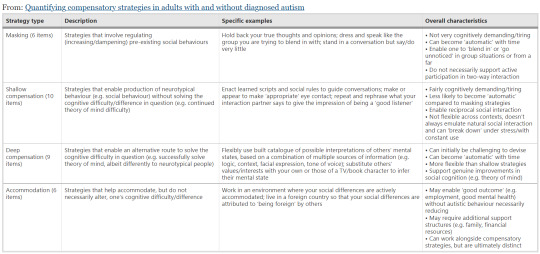
I have already come across most of this online (or in books) when reading about masking, but deep compensation strategies - in which a person can use a different part of the brain to perform a function, often solving intellectually what most people solve by instinct - were a new concept to me and helped me a lot, since it is often co-present with other strategies but was rarely talked about.

(Venn diagrams showing the number of a Diagnosed and b Non-diagnosed participants that reported using masking, shallow compensation, deep compensation and/or accommodation strategies. Overall, participants were more likely to report strategies across multiple types, than a single strategy type. This pattern was broadly similar between the two groups, but there was a significant group difference in shallow compensation)
The biggest take away is that, when this becomes an ingrained habit, people will be able to "understand" social cues and to deduce what people are thinking/feeling (especially when combined with acommodations in the environment) and this can come up as a failure to identify with a few traits people with asd have (but still feel autistic).
Deep compensation (subtheme), involving complex and flexible strategies, contributed to some improvements in social cognition. Some participants reported using pattern detection and internal data modelling (gesture + facial expression + context = particular mental state) to understand others. These strategies, although hard to implement at first, could become “second nature” with time.
To modulate compensatory efforts, many participants described compensating after logically assessing the costs versus benefits (subtheme). For example, compensation was considered worthwhile to make a positive impression towards a friendship, but not for interactions with inconsequential strangers. In superficial interactions, masking was preferred over compensatory strategies to conserve resources.
Compensation typically resulted in a lack of support in adulthood because participants looked “too normal” (subtheme). Employed participants reported that employers and colleagues held them to a neurotypical standard, which resulted in social errors not being interpreted in the context of autism. Because autistic characteristics went undetected by others, many participants reported that it was difficult to request, and they were unlikely to receive, workplace accommodations.
“I think I observe patterns in behaviour and then try to transfer this. So if a person is behaving x/y/z types of ways, they could be feeling or thinking what so and so people had felt. It's almost a case of systematically storing little patterns in each person and the context, so I can refer to it in future.”
There is another quote that I loved but simply cannot find rn. It must be somewhere in the papers or related literature, so I recommend reading it if you are willing. I also found some great charts last night that i can't locate rn.
Personally, I was quite shocked to find out that people take social cues by instinct, because i legit thought everyone deduced what people feel/think and it was second nature to them simply because they had more social interaction and were more at ease around people and therefore social interaction becomes better with time after you learn and become familiar with different behaviours and learn how to react. I thought this was the "normal way" people go through life and some were simply more skilled at it (learning faster and better at deducing). Well, it seems it is not the case. I can't make any good summary of the papers, but I hope the quotes I shared here can help some people as they have helped me.
#asd#actually autistic#masking#accommodation#compensation#deep compensation#theory of mind#autistic adult#late diagnosed autistic#autism#autistic masking#autistic community#camouflage#late diagnosed autism
107 notes
·
View notes
Text
my life ambition is to be so annoying that someone pays me $21 mil just to leave them alone
#MAXIMUM SLAY#f1#daniel ricciardo#this is written 100% endearingly for get ur bag king#COMPENSATION#praga
104 notes
·
View notes